



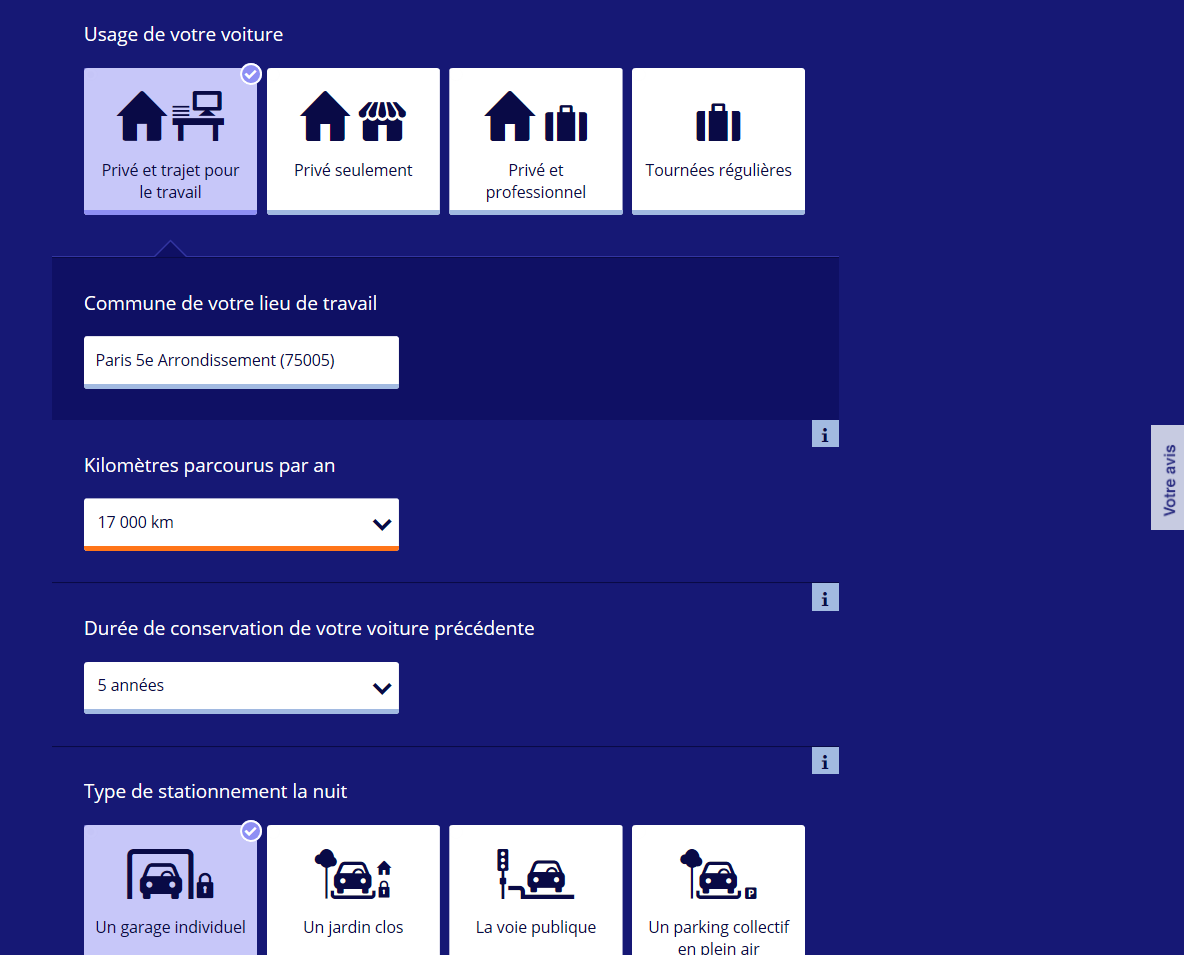
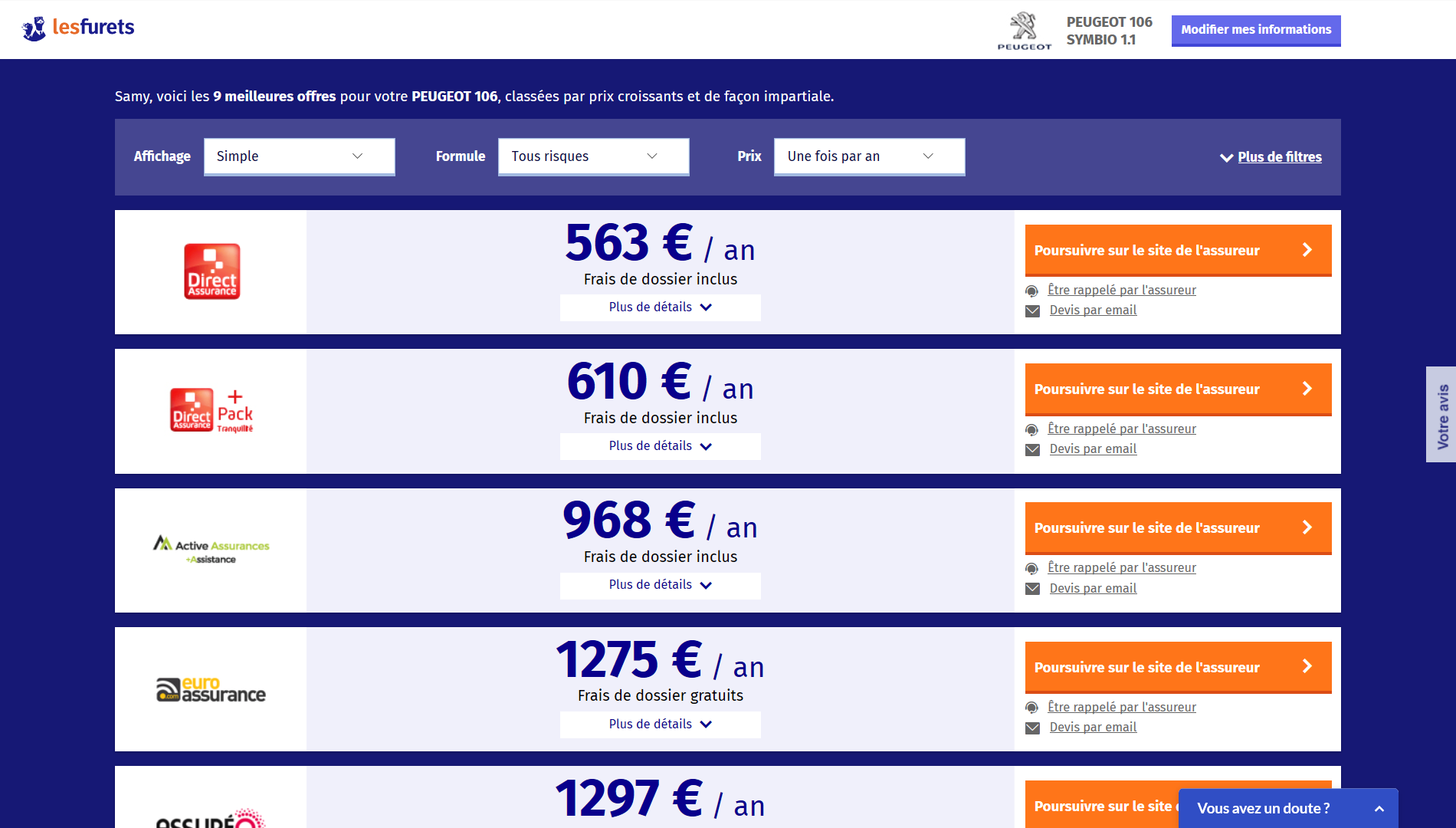
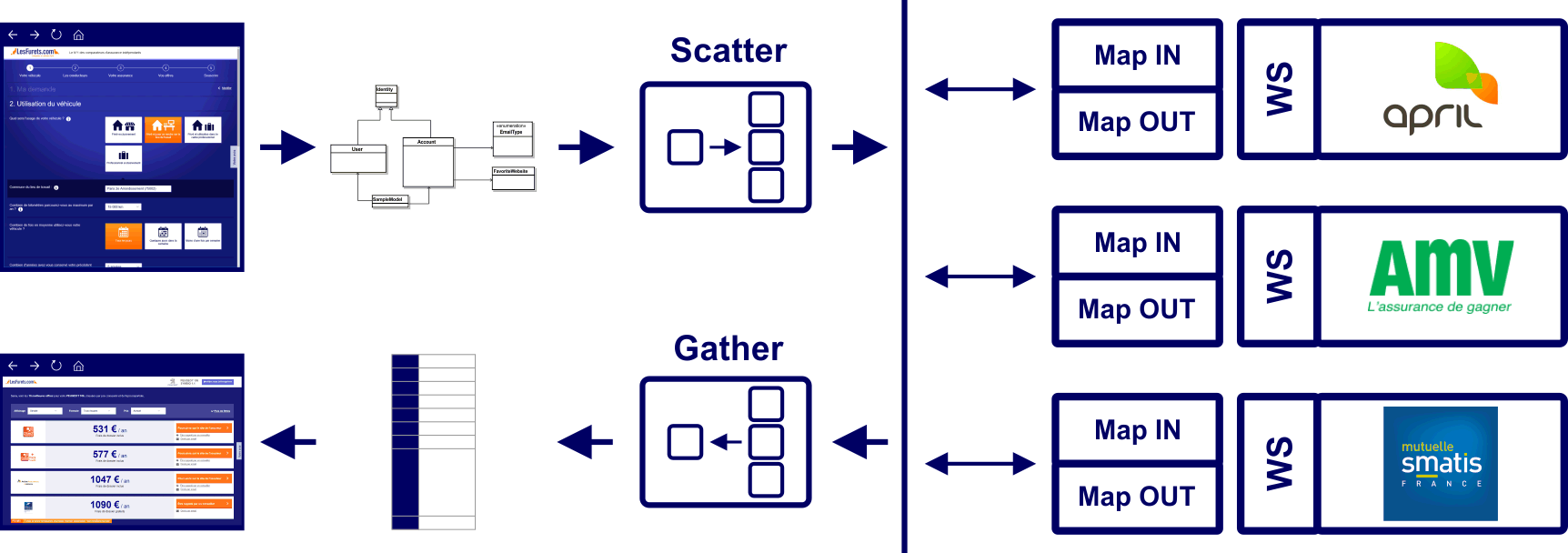
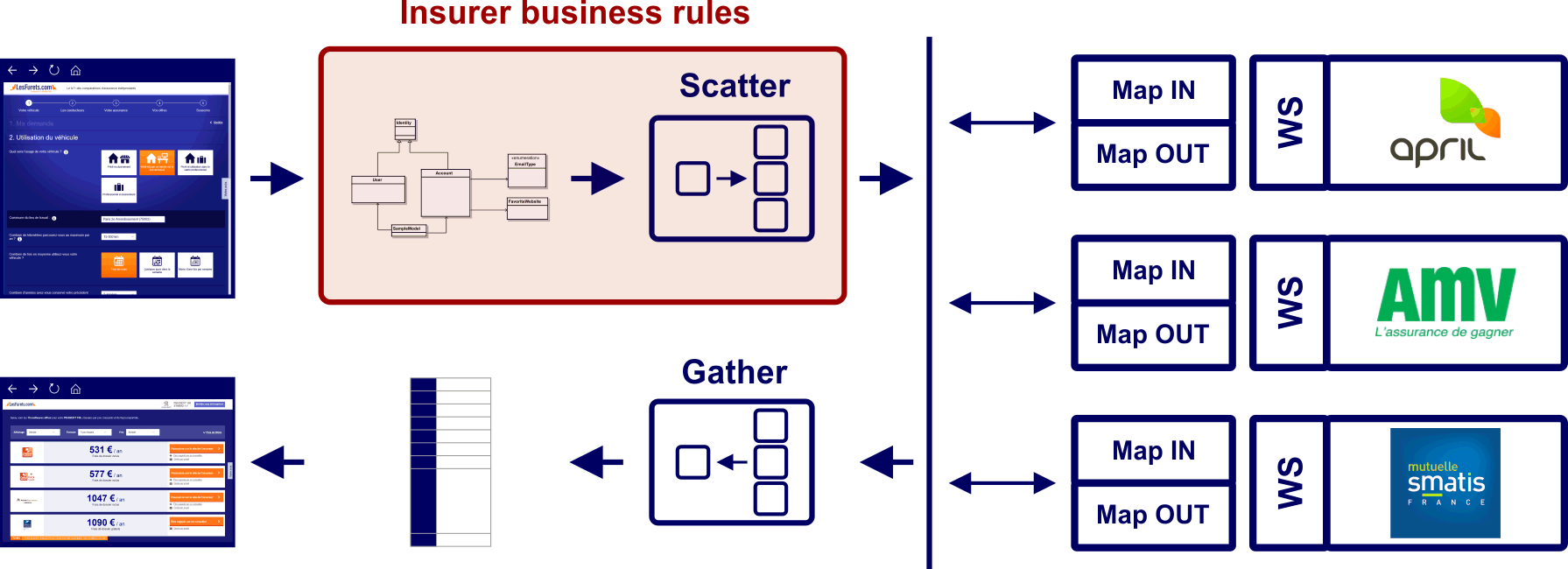
We have 100 live insurers, on 5 products, each with business validation rules, that filter prospects based on their profile
Hierarchy of 492 legacy classes, no governance or auditability
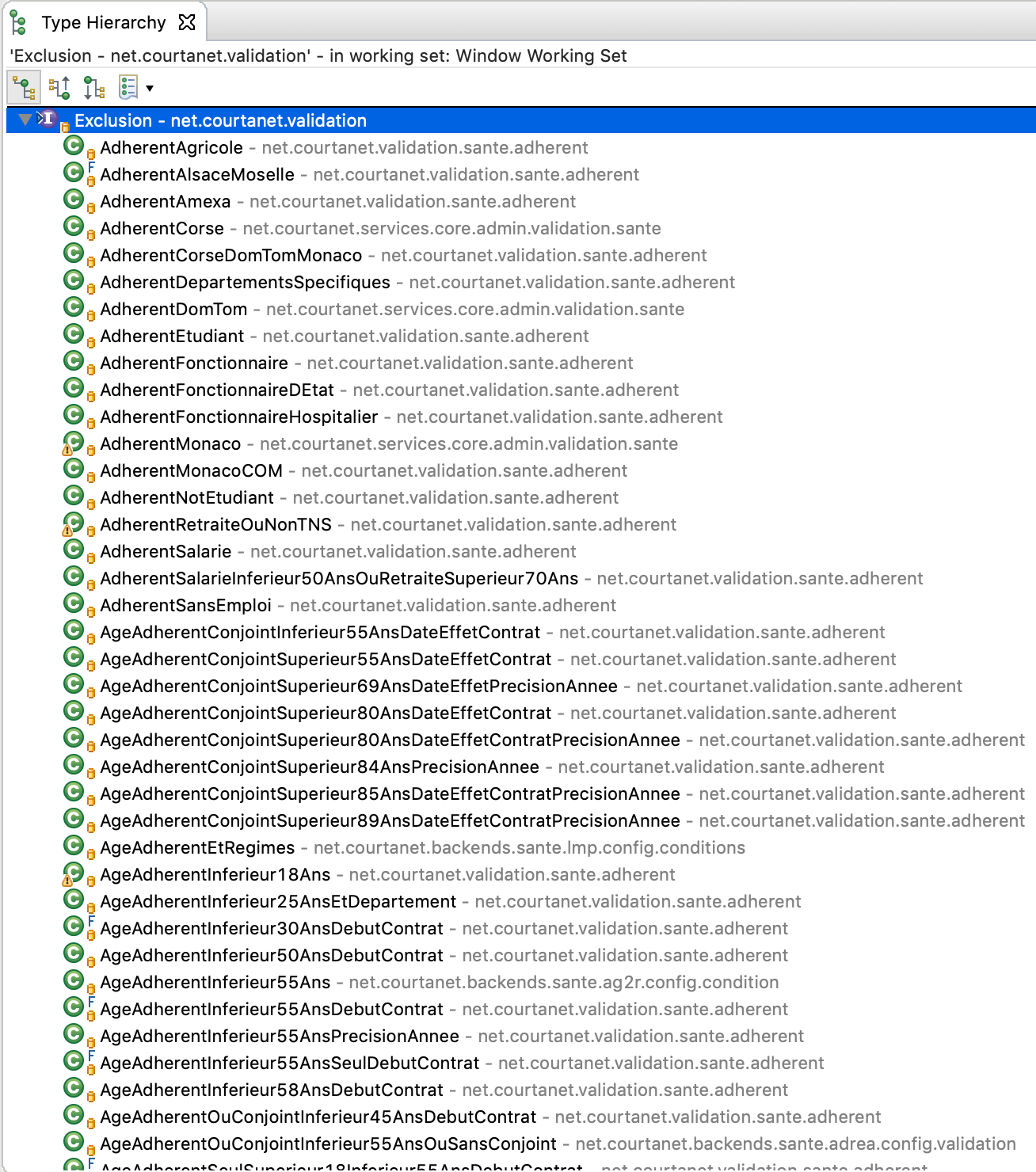
Insurer exclusions based on object model (legacy code)
public void check(FieldContext context, FormuleMoto formule, Conducteur conducteur,
Vehicule vehicule, Void unused, Besoins besoins,
Set<EAbTestingScenario> scenarios)
throws ExclusionException {
if (besoins == null) {
return;
}
if (besoins.getDateDebutContrat() == null) {
return;
}
if (!DateHelper.isAfter(besoins.getDateDebutContrat(),
DateHelper.ajouteJoursADate(DateHelper.getToday(), NBR_JOURS),
DateHelper.EPrecision.jour)) {
throw new ExclusionException(DATE_EFFET_PLUS_60_JOURS);
}
}
Same rule, more fluent:
public ExclusionRule exclusionRule() {
return DOOV.when(dateContrat().after(todayPlusDays(60)))
.exclusionRule();
}
Java is verbose, but you can reduce the noise and write code like natural language with a fluent API
// SQL query with jOOQ
DSL.using(conn)
.selectFrom(SALES)
.where(MODULE.equal(module.getIntValue()))
.and(NOTIF_DATETIME.greaterOrEqual(from))
.and(DELETED.equal(SaleState.NO.getIntValue()))
.stream()
.map(SalesDAO::toSale)
.collect(toList());
Domain Object Oriented Validation
dOOv is a fluent API for typesafe domain model validation
dOOv : Under the hood
DOOV.when(accountCompany.eq(Company.LES_FURETS)
.and(accountPhoneNumber.startsWith("+33"))).validate();
public static boolean validateAccount(User user,
Account account, Configuration config) {
if (config == null) {
return false;
}
if (user == null || user.getBirthDate() == null) {
return false;
}
if (account == null || account.getCountry() == null ||
account.getPhoneNumber() == null) {
return false;
}
if (YEARS.between(user.getBirthDate(), LocalDate.now()) >= 18
&& account.getEmail().length() <= config.getMaxEmailSize()
&& account.getCompany() == Company.LES_FURETS
&& account.getPhoneNumber().startsWith("+33")) {
return true;
}
return false;
}
public static SampleModel sample() {
User user = new User();
user.setId(1);
user.setFirstName("Foo");
user.setLastName("BAR");
// ...
Account account = new Account();
account.setCompany(Company.LES_FURETS);
account.setId(9);
// ...
public class Account extends Identity {
@SamplePath(field = SampleFieldId.LOGIN, readable = "account.login")
private String login;
// ...
@SamplePath(field = SampleFieldId.COMPANY, readable = "account.company")
private Company company;
// ...
SampleModelResourceBundle_en_US.properties
account.login = account login
account.password = account password
account.country = account country
account.company = account company
...
SampleModelResourceBundle_fr_FR.properties
account.login = l'identifiant de connection
account.country = le pays
account.company = la soci\u00e9t\u00e9
...
> ./gradlew -p sample build
BUILD SUCCESSFUL in 23s
10 actionable tasks: 3 executed, 7 up-to-date
public class RulesCodeOneTest {
SampleModelRule demoRule = DslSampleModel
.when(DOOV.matchAll(
userBirthdate.ageAt(today()).greaterOrEquals(18),
accountEmail.length().lesserOrEquals(configurationMaxEmailSize),
accountCompany.eq(Company.LES_FURETS),
accountPhoneNumber.startsWith("+33")))
.validate();
}
@Test
public void test_account() {
SampleModel sample = SampleModels.sample();
Result result = demoRule.executeOn(sample);
Assertions.assertThat(result).isTrue();
System.out.println(demoRule.readable());
System.out.println(demoRule.markdown(Locale.FRANCE));
}
rule when match all [user birthdate age at today >= 18, //
account email length is <= configuration max email size, //
account company = LES_FURETS, account phone number starts with '+33'] validate
* règle
* lorsque
* correspond à tous
* la date de naissance âge à la date du jour >= 18
* l'émail a une longueur <= la taille maximum de l'émail
* la société = LES_FURETS
* le numéro de téléphone commence par '+33'
* valider
@Test
public void test_account_failure_cause() {
SampleModel sample = SampleModels.sample();
sample.getAccount().setPhoneNumber("+1 12 34 56 78");
Result result = demoRule.executeOn(sample);
Assertions.assertThat(result).isTrue();
}
java.lang.AssertionError: Expected result to be true
(invalidated nodes: [account phone number starts with '+33'])
@Test
public void test_account_failure_cause() {
SampleModel sample = SampleModels.sample();
sample.getAccount().setPhoneNumber("+1 12 34 56 78");
Result result = demoRule.executeOn(sample);
Assertions.assertThat(result)
.isFalse()
.hasFailureCause("account phone number starts with '+33'");
}
@Test
public void test_account_failure_cause_2() {
SampleModel sample = SampleModels.sample();
sample.getAccount().setPhoneNumber("+1 12 34 56 78");
sample.getAccount().setCompany(Company.BLABLACAR);
Result result = demoRule.withShortCircuit(false).executeOn(sample);
Assertions.assertThat(result)
.isFalse()
.hasFailureCause("match all [account company = LES_FURETS, " +
"account phone number starts with '+33']");
}
Validate that a profile
has an email with less than 20 characters
has at least 18 years when their country is France
their country is France when their phone number starts with '+33'
DOOV.when(accountEmail.length().lesserThan(20)
.and(userBirthdate.ageAt(today()).greaterThan(18)
.and(accountCountry.eq(Country.FR)))
.and(accountCountry.eq(Country.FR)
.and(accountPhoneNumber.startsWith("+33"))))
.validate();
model.getAccount().setEmail("test@test.org");
model.getAccount().setCountry(Country.FR);
model.getUser().setBirthDate(LocalDate.now().minusYears(19));
ValidationRule rule = DOOV
.when(accountEmail.length().lesserThan(20)
.and(userBirthdate.ageAt(today()).greaterThan(18)
.and(accountCountry.eq(Country.FR)))
.and(accountCountry.eq(Country.FR)
.and(accountPhoneNumber.startsWith("+33"))))
.validate();
Result result = rule.withShortCircuit(false).executeOn(wrapper);
System.out.println("> " + result.getFailureCause());
> account phone number starts with '+33'
Validate that a profile match at least two conditions :
DOOV.when(count(
userBirthdate.ageAt(today()).greaterThan(18),
accountCountry.eq(Country.FR),
accountPhoneNumber.startsWith("+33")).greaterThan(1))
.validate();
model.getUser().setBirthDate(LocalDate.now().minusYears(19));
model.getAccount().setCountry(Country.CAN);
model.getAccount().setPhoneNumber("1 23 45 67 89");
ValidationRule rule = DOOV
.when(count(
userBirthdate.ageAt(today()).greaterThan(18),
accountCountry.eq(Country.FR),
accountPhoneNumber.startsWith("+33"))
.greaterThan(1))
.validate();
Result result = rule.withShortCircuit(false).executeOn(wrapper);
System.out.println("> " + result.getFailureCause());
> account country = FR and account phone number starts with '+33'
Annotation based APIs for validating POJOs
Bean Validation 2.0 : JSR 380
Reference implementation : Hibernate Validator
Bean Validation rules are not strongly typed since it's annotation based. This code will fail at compile time, but your IDE won't be able to tell you why.
public class Account {
@NotNull @Email
private Email email;
}
Because Bean Validation constraints are based on field annotation, cross validation between fields are only available through the extension mechanism.
public class Account {
@Pattern(regexp = "(FR)|(UK)")
private String country;
@Pattern(regexp = "???")
private String phoneNumber;
}
Bean Validation rules are not written with a natural language syntax and does not provide a syntax tree
@Size(min = 10, max = 200,
message = "About Me must be between 10 and 200 characters")
private String aboutMe;
userAboutMe().length().between(10, 200).validate().readable()
> When user about me length is between 10 and 200, validate
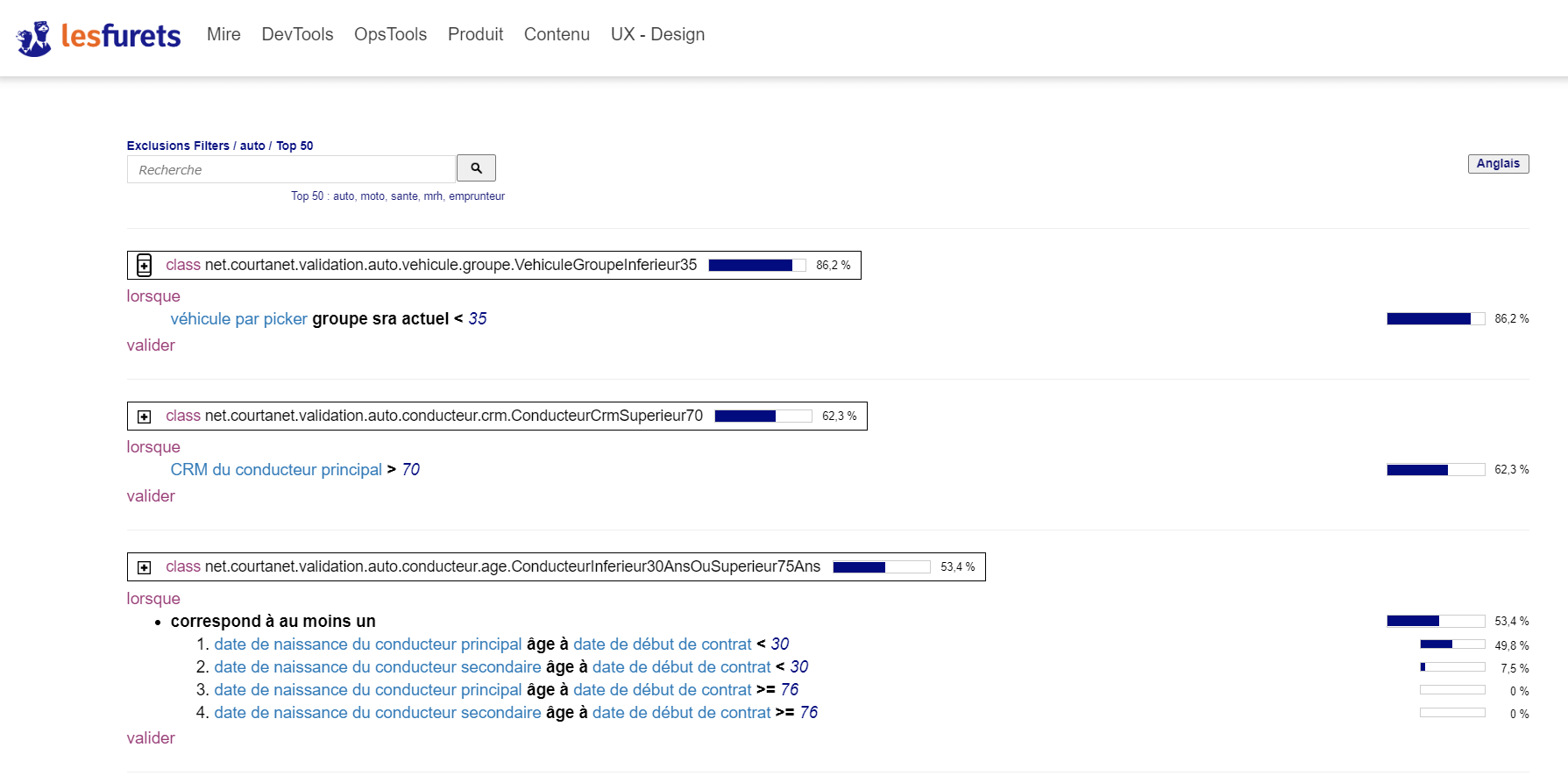
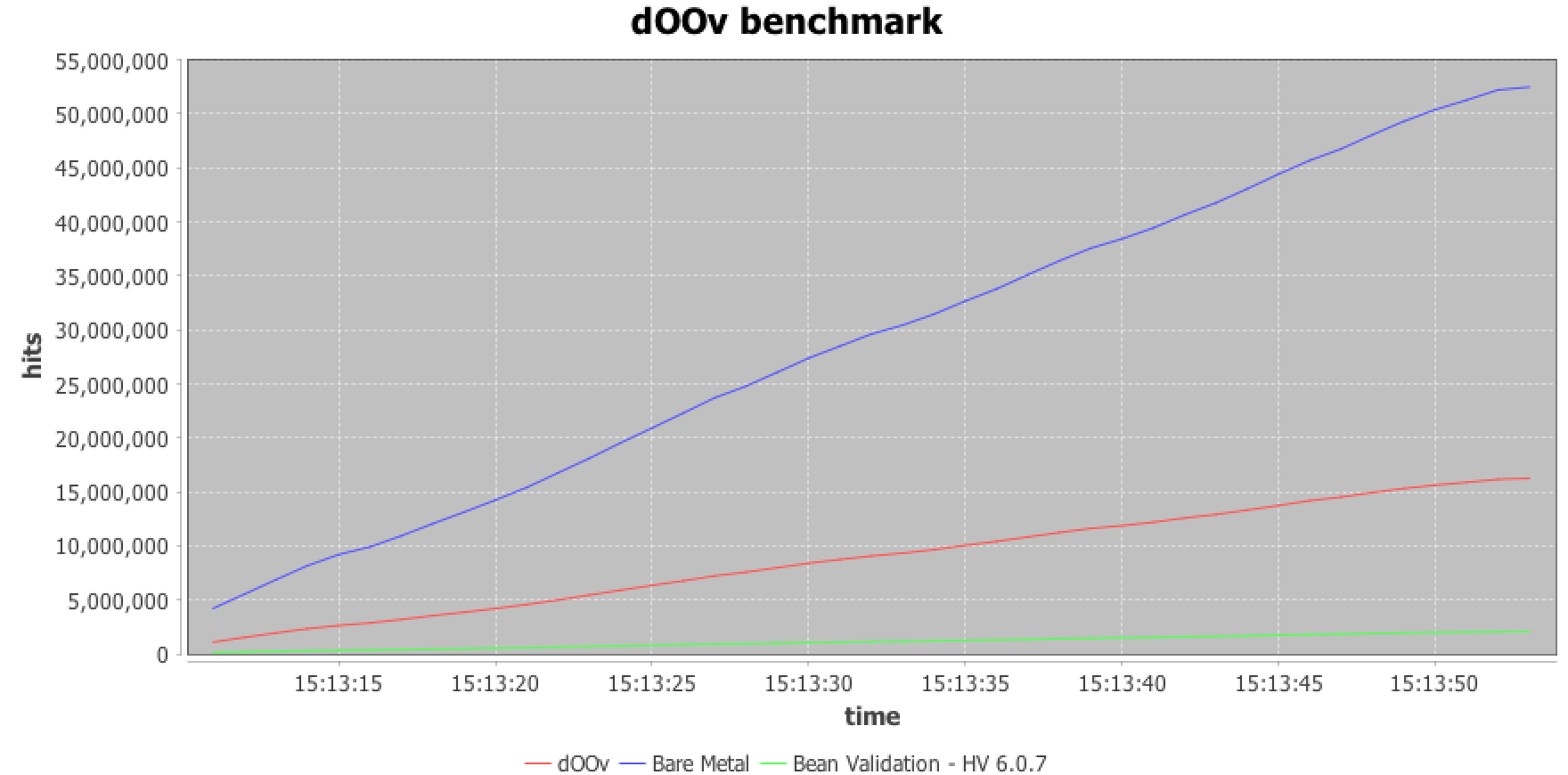
enum Company {
BLABLACAR, CANAL_PLUS, DAILYMOTION,
LES_FURETS, MEETIC, OODRIVE,
}
Validate that the company of an account should
NOT be
Dailymotion or Blablacar
DOOV.when(accountCompany.noneMatch(DAILYMOTION, BLABLACAR)).validate();
¬ DAILYMOTION ∧ ¬ BLABLACAR
// is equivalent to
¬ ( DAILYMOTION ∨ BLABLACAR )
// is equivalent to
LES_FURETS ∨ CANAL_PLUS ∨ MEETIC ∨ OODRIVE
De Morgan's laws
https://en.wikipedia.org/wiki/De_Morgan's_laws
https://en.wikipedia.org/wiki/Conjunctive_normal_form
Failure cause with noneMatch
model.getAccount().setCompany(DAILYMOTION);
ValidationRule rule = DOOV
.when(accountCompany.noneMatch(DAILYMOTION, BLABLACAR))
.validate();
Result result = rule.withShortCircuit(false).executeOn(model);
System.out.println("> " + result.getFailureCause());
> account company match none : DAILYMOTION, BLABLACAR
Failure cause with notEq + and
DOOV.when(accountCompany.notEq(DAILYMOTION)
.and(accountCompany.notEq(BLABLACAR))).validate();
> account company != DAILYMOTION
Conjuctive Normal Form (CNF)
Failure cause with not + or
DOOV.when(accountCompany.eq(DAILYMOTION)
.or(accountCompany.eq(BLABLACAR)).not()).validate();
> not (account company = DAILYMOTION or account company = BLABLACAR)
Failure cause with anyMatch
DOOV.when(accountCompany.anyMatch(LES_FURETS, CANAL_PLUS, MEETIC, OODRIVE))
.validate();
> account company != DAILYMOTION
Failure cause with eq + or
DOOV.when(accountCompany.eq(LES_FURETS).or(accountCompany.eq(CANAL_PLUS)
.or(accountCompany.eq(MEETIC).or(accountCompany.eq(OODRIVE)))))
.validate();
> account company = LES_FURETS or (account company = CANAL_PLUS
or (account company = MEETIC or account company = OODRIVE))
Benchmark Mode Cnt Score Error Units
noneMatch thrpt 20 8775.818 ± 148.951 ops/ms
notEq + and [failure cause OK] thrpt 20 5022.391 ± 147.550 ops/ms
not + or thrpt 20 3022.433 ± 586.881 ops/ms
anyMatch [failure cause OK] thrpt 20 6002.415 ± 94.531 ops/ms
eq + or thrpt 20 1855.837 ± 50.183 ops/ms
Benchmark Mode Cnt Score Error Units
noneMatch with short circuit thrpt 20 6839.429 ± 262.318 ops/ms
notEq + and with short circuit thrpt 20 7397.586 ± 252.090 ops/ms
not + or with short circuit thrpt 20 5084.227 ± 450.013 ops/ms
anyMatch with short circuit thrpt 20 6275.185 ± 56.600 ops/ms
eq + or with short circuit thrpt 20 1820.198 ± 60.300 ops/ms
Writing rules in CNF provides the best performance and failure causes
We migrated our 492 business rules to dOOv,
we now have
compliance,
auditability,
governance,
clarity
(and more!)
Next step is extending the DSL to create an object to object mapping framework, Domain Object Oriented Mapping ( dOOm). It will feature the same AST to text and statistics functionnalities.
DOOV.mappings(
map(userEmail).to(insurerEmail),
map(userFirstName, userLastName)
.using(StringJoiner)
.to(insurerFullName),
when(userCountry.eq(FR))
.map(userPhone.to(insurerPhone))
)
Stay tuned for the next versions!
"A domain-specific language (DSL) is a computer language specialized to a particular application domain. This is in contrast to a general-purpose language (GPL), which is broadly applicable across domains"
key model
// Root class of model
class Model {
User user;
}
// Add key named EMAIL
enum ModelFieldId {
EMAIL;
}
// Annotate email field
class User {
@Path(field = EMAIL
readable = ...)
String email;
}
code generate
// dOOv typed field class
class DslModel {
StringFieldInfo userEmail;
}
write rules
// Create rules by using
// generated fields
// in DslModel
DslModel
.when(userEmail.eq(...))
.validate()
// Optionaly add rules
// to a registry
.registerOn(DEFAULT);
get model
// Get model from somewhere
// or instanciate it
User user = new User();
user.setEmail("e@mail.com");
Model model = new Model();
model.setUser(user);
execute
// Use executeOn method
DslModel.when(email.matches(...))
.validate()
.executeOn(model);
// Or use the registry
DEFAULT.stream()
.map(rule -> rule.executeOn(model));
Java is verbose, but you can reduce the noise and write code like natural language with a fluent API
// JUnit API
assertEquals(9, fellowshipOfTheRing.size());
assertTrue(fellowshipOfTheRing.contains(frodo, sam));
assertFalse(fellowshipOfTheRing.contains(sauron));
// AssertJ API (fluent)
assertThat(fellowshipOfTheRing).hasSize(9)
.contains(frodo, sam)
.doesNotContain(sauron);
New elements in Java 8 makes it easier to write a fluent API
// java.util.function (io.doov.core.dsl.impl.LogicalBinaryCondition)
left.predicate().and(right.predicate()).test(model, context)
// java.util.stream (io.doov.core.dsl.impl.LogicalNaryCondition)
steps.stream().anyMatch(s -> s.predicate().test(model, context))
// lambda and method reference (io.doov.core.dsl.impl.NumericCondition)
predicate(greaterThanMetadata(field, value),
(model, context) -> Optional.ofNullable(value),
(l, r) -> greaterThanFunction().apply(l, r));
Many popular libraries propose fluent APIs like
jOOQ,
AssertJ,
Apache Spark, etc.
Dataset<Row> averagePrice = prices
.filter(value.<String>getAs("insurer")
.equals("COOL insurer"))
.groupBy("product")
.agg(avg("price").as("average"))
.orderBy(desc("average"));
Makes readable text generation possible:
we can output a multi-language rules catalog
in multiple formats (text, markdown, HTML, etc.)
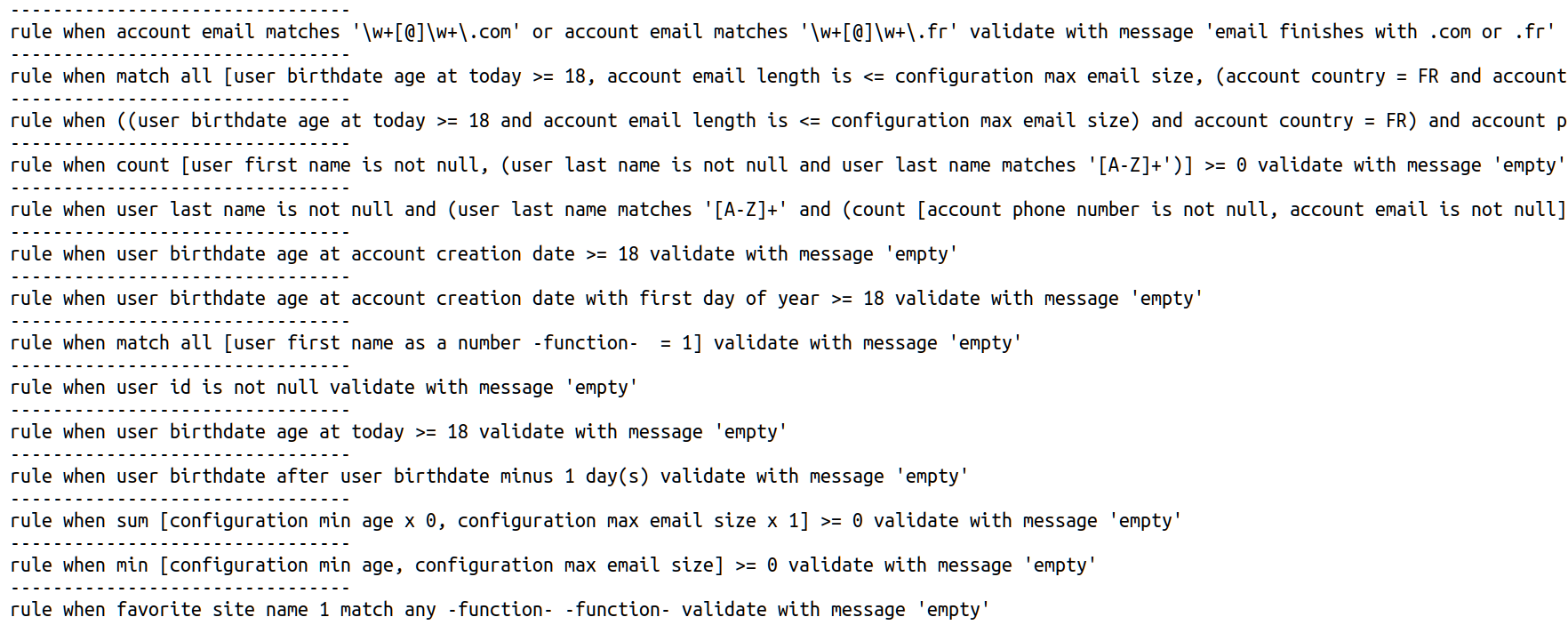
We make daily statistics that helps us shape the business,
by removing or tweaking rules as needed
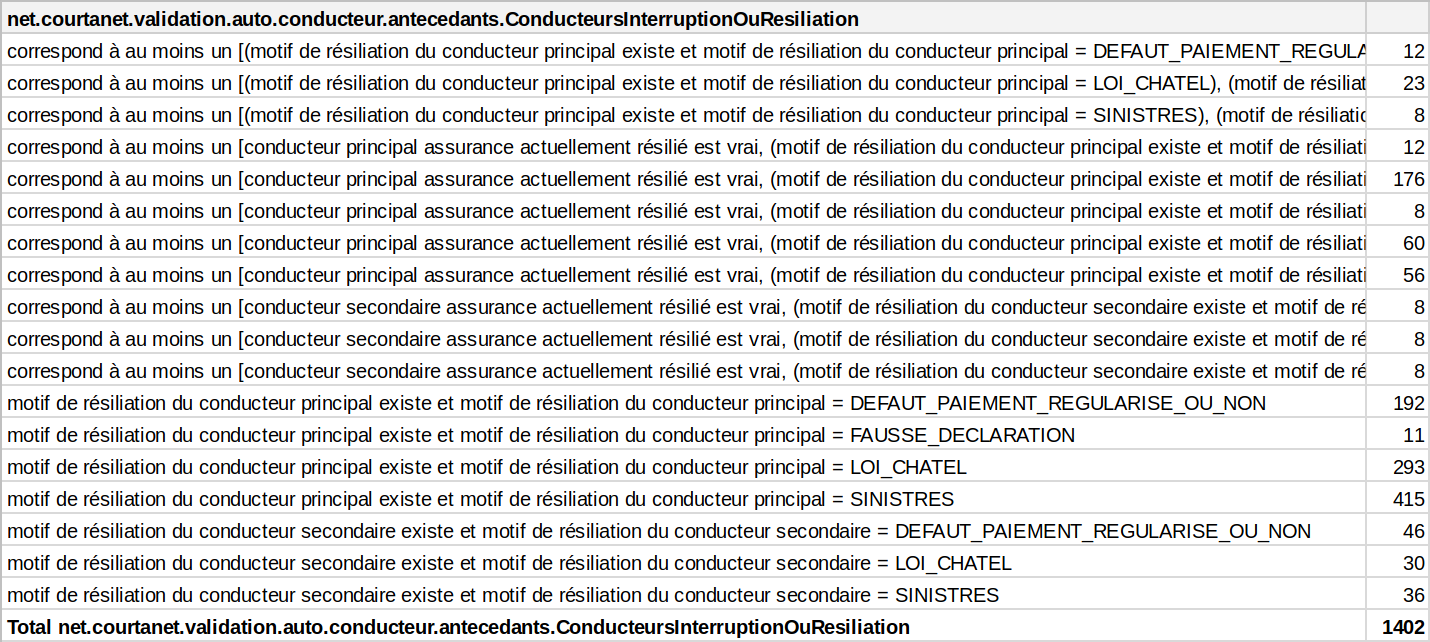
Validate that a profile
has at least 18 years when their country is France
and their phone number starts with '+33'
has at least 21 years when their country is Canadian
and their phone number starts with '+1'
DOOV.when(userBirthdate.ageAt(today()).greaterThan(18)
.and(accountCountry.eq(Country.FR)
.and(accountPhoneNumber.startsWith("+33")))
.or(userBirthdate.ageAt(today()).greaterThan(21)
.and(accountCountry.eq(Country.CAN)
.and(accountPhoneNumber.startsWith("+1")))))
.validate();
model.getUser().setBirthDate(LocalDate.now().minusYears(22));
model.getAccount().setCountry(Country.FR);
ValidationRule rule = DOOV
.when(userBirthdate.ageAt(today()).greaterThan(18)
.and(accountCountry.eq(Country.FR)
.and(accountPhoneNumber.startsWith("+33")))
.or(userBirthdate.ageAt(today()).greaterThan(21)
.and(accountCountry.eq(Country.CAN)
.and(accountPhoneNumber.startsWith("+1")))))
.validate();
Result result = rule.withShortCircuit(false).executeOn(wrapper);
System.out.println("> " + result.getFailureCause());
> account phone number starts with '+33'
or (account country = CAN and
account phone number starts with '+1')
Validate that a profile
has at least 18 years when their country is France
and their phone number starts with '+33'
has at least 21 years when their country is Canadian
and their phone number starts with '+1'
DOOV.when(matchAny(
matchAll(userBirthdate.ageAt(today()).greaterThan(18),
accountCountry.eq(Country.FR),
accountPhoneNumber.startsWith("+33")),
matchAll(userBirthdate.ageAt(today()).greaterThan(21),
accountCountry.eq(Country.CAN),
accountPhoneNumber.startsWith("+1"))))
.validate();
model.getUser().setBirthDate(LocalDate.now().minusYears(22));
model.getAccount().setCountry(Country.FR);
ValidationRule rule = DOOV
.when(matchAny(
matchAll(userBirthdate.ageAt(today()).greaterThan(18),
accountCountry.eq(Country.FR),
accountPhoneNumber.startsWith("+33")),
matchAll(userBirthdate.ageAt(today()).greaterThan(21),
accountCountry.eq(Country.CAN),
accountPhoneNumber.startsWith("+1"))))
.validate();
Result result = rule.withShortCircuit(false).executeOn(wrapper);
System.out.println("> " + result.getFailureCause());
> match any [account phone number starts with '+33',
match all [account country = CAN,
account phone number starts with '+1']]
Validate that a profile country is Canadian or French
DOOV.when(accountCountry.anyMatch(Country.CAN, Country.FR)).validate();
model.getAccount().setCountry(Country.UK);
ValidationRule rule = DOOV
.when(accountCountry.anyMatch(Country.CAN, Country.FR))
.validate();
Result result = rule.withShortCircuit(false).executeOn(wrapper);
System.out.println("> " + result.getFailureCause());
> account country != UK